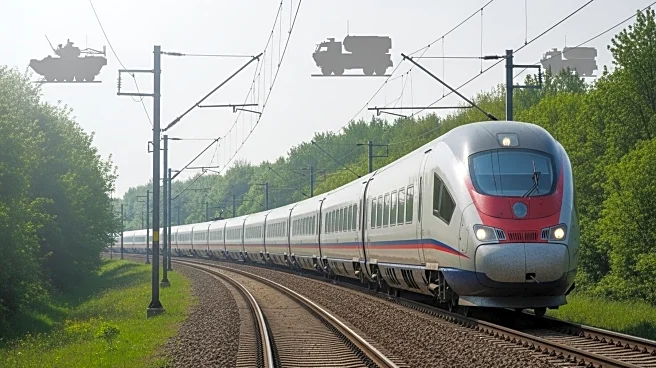What is the story about?
What's Happening?
Brig. Gen. Fabrice Feola, responsible for coordinating military transport in France, has raised concerns about bureaucratic hurdles affecting the rapid deployment of troops and equipment to NATO's eastern flank. As tensions rise due to Russia's war in Ukraine, the European Union aims to streamline military mobility, targeting a five-day approval process for cross-border military convoys. However, current procedures often exceed this timeframe, taking 'tens of days' according to Feola. The EU plans to address these barriers with new regulations, emphasizing the need for efficient rail transport to support military operations. France has significantly increased its military rail transports since the conflict began, underscoring the importance of railways in strategic deployments.
Why It's Important?
The ability to quickly mobilize military resources is crucial for NATO's strategic positioning in Eastern Europe, especially in light of ongoing tensions with Russia. Efficient rail transport is vital for moving large quantities of military equipment, such as tanks and ammunition, across Europe. The delays in approval processes could hinder NATO's readiness and response capabilities, potentially impacting the security of member states. Streamlining these procedures would not only enhance military efficiency but also strengthen the alliance's deterrence posture against potential threats. Countries like France, Germany, and the Netherlands are leading efforts to establish dedicated corridors for military transport, which could serve as a model for broader EU initiatives.
What's Next?
The EU is expected to unveil new military mobility rules aimed at simplifying cross-border transport procedures. France is advocating for the identification of corridors capable of handling military convoys, addressing infrastructure challenges like tunnel and bridge capacities. Germany, the Netherlands, and Poland have already signed a declaration to establish such corridors, focusing on reducing bureaucratic obstacles. The EU's efforts to digitize customs documents and expedite authorization processes are anticipated to improve military logistics across the continent. These developments could lead to more coordinated and efficient military operations, enhancing NATO's strategic capabilities in Eastern Europe.
Beyond the Headlines
The push for improved military mobility in Europe highlights broader geopolitical shifts, with NATO's focus increasingly on Eastern Europe rather than Africa. This shift necessitates robust infrastructure capable of supporting large-scale military movements. The initiative also underscores the importance of international cooperation in defense logistics, as countries work together to overcome regulatory and infrastructural barriers. The establishment of dedicated military corridors could set a precedent for future collaborative efforts in other regions, potentially influencing global military logistics standards.















